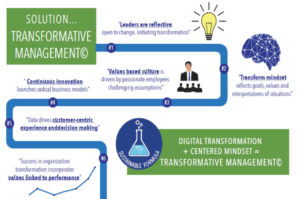Ira Kaufman and Jean AbiNader
When Donald Trump seized the presidential election, many pundits shifted from predicting his demise to exploring what they had missed. How did the best political analysts and pollsters with the best data miss the outcome so dramatically?
Pundits and experts will discuss possible errors for years to come. This year, the political landscape reflected what has been happening in the 21st century business world. The lesson is pervasive with far reaching implications for businesses and organizations globally.
Disruption is unpredictable, inescapable and knocking at your door!
Whether you’re looking at the Trump presidential surprise, AirBnB, Thumbtack, Uber, or pop-up restaurants (linking star chefs to foodies), what we are learning is that there is no one-size fits-all digital mindset as these breakthrough businesses demonstrate in moving beyond the traditional product and service centered business model to leverage the exponential opportunities of a network driven model, it is clear that network thinking doesn’t just affect technology and mindset, but everything from decision making to value creation, from talent acquisition to innovation, from measurement to sustainable outcomes.
What will it take to manage disruption?
Beyond the pervasive reality of disruption are formidable challenges of how to operate and execute in this ever-changing environment. How does disruption create opportunities for innovation, growth, new products and services, and rapidly changing communications?
Based on work being done globally, there are some realities that we can define, and label Transformative Management©. While most classic stories of business disruption involve manufacturers, and most often involves disruption from competitors of less expensive or different products, digital technologies have accelerated disruption and revolutionized service industries. Any transaction is susceptible, from marketing to delivery. If you think that there are companies that cannot be challenged by an outsider providing your product or service in an unforeseen way, just wait.
Already, today’s business leaders recognize this challenge as a danger or a vast opportunity. A global study of 3,400 leaders by Deloitte found 90% of executives expect to face digital disruption.
However, the critical finding is that fewer than half feel their companies are prepared to deal with that challenge. They don’t have the skillsets or the talent to execute an transformation strategy. This poses massive opportunities for the few firms that prime themselves to create and “own” digital disruption, but it threatens thousands of jobs in companies not ready to innovate.
The key to managing disruption is harnessing your organization’s capacity to remake your business in this digital era. The first step is developing organization-wide capabilities to manage transformation.
So, when you hear the knocking, get ready by migrating your organization through the process of Transformative Management©.

Transformative Management© is a clarion call to leaders and managers to anticipate and navigate the forces of disruption, positioning their organization for the inevitable changes. Here are six tasks that distinguish the approach.
- Leaders are reflective, open to change, initiating transformation. “Networked businesses require leaders to adopt not only what they do, but how they think.”
- Transformative mindset reflects goals, values and interpretations of situations. It propels “business to think of change as a whole.”
- Values based culture is driven by passionate employees challenging assumptions. “Few executives effectively apply change management techniques.”
- Continuous innovation launches radical business models. “Transformation thrives on ongoing innovation.”
- Data drives customer-centric experience and decision making. “Customer Experience Is The Catalyst For Digital Transformation.”
- Successful transformation incorporates values linked to performance. “Creating Shared Value generates competitive advantage while delivering tangible social benefits.”
Transformative Management© suggests four executive actions:
- Listen and observe the signs to disruption
- Adapt your mindset for the inevitable changes
- Focus your culture on its values and generating sustainable outcomes
- Build your team to anticipate and “own” disruption
This approach to managing digital disruption is supported by Citigroup’s recent study, which indicates that leading a digital company “does not require technologists at the helm.” In fact, most leaders and managers list high level soft skills such as transformative vision, forward thinking, a change-oriented mindset, and other collaborative and leadership skills as the key attributes.
Transformative Management© provides a values-driven framework for managing continuous change, leveraging data and sustaining digital Transformation while fueling purposeful impact. It has been implemented with non-profits, mid-size businesses and multinationals.
Digital disruption is here; its benefits depend on your company’s willingness to adopt and nurture a culture that embraces change and progressive adaptation at all levels.
“Are you driving change or are you driven by it?”
**********
Ira Kaufman, Entwine Digital (www.entwinedigital.com), CEO, Author (Digital Marketing: Integrating Strategy, Tactics with Values). He has 40 years of marketing experience spans three worlds: business, nonprofit and education. As a digital transformation strategist, he helps companies ranging from multinationals to start-ups with their leadership, integrated digital marketing and transformation strategies.
Jean AbiNader, Entwine Digital-Senior Adviser Strategic Communications. He focuses on growth and messaging strategies for clients in challenging domestic and international environments. As a strategic planner, he was head of operations for a major US news company and senior executive for trade and political advocacy organizations.




